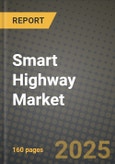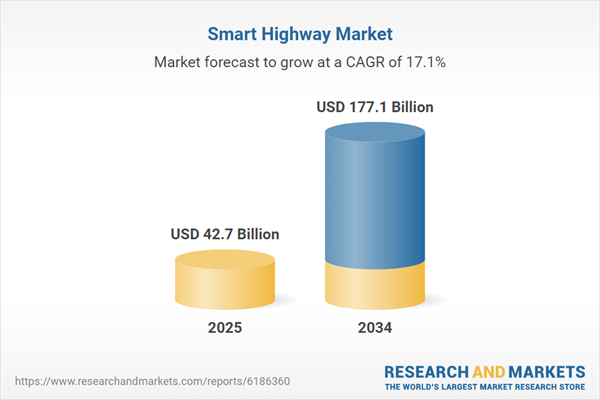The smart highway market is emerging as a key pillar in the evolution of intelligent transportation infrastructure, driven by the need for safer, more efficient, and environmentally sustainable road systems. Smart highways incorporate a blend of technologies such as IoT sensors, adaptive lighting, wireless communication, real-time traffic monitoring, and autonomous vehicle support to enhance the travel experience. These roadways go beyond conventional construction by enabling real-time data exchange between vehicles and infrastructure, allowing for dynamic traffic control, early hazard warnings, and predictive maintenance. With increasing global traffic congestion, rising accident rates, and growing demand for greener mobility solutions, governments and private sector players are investing in smart highway projects that integrate renewable energy sources, connected vehicle platforms, and digital tolling systems. This convergence of infrastructure and digital innovation is redefining roadway management and shaping the future of mobility.
The smart highway market advanced significantly, with multiple pilot programs and full-scale implementations being launched globally. In Europe and Asia, smart highway corridors equipped with vehicle-to-everything (V2X) communication, AI-powered traffic management, and solar road panels were tested to enhance traffic efficiency and sustainability. North America saw a rise in deployments of dynamic signage systems and adaptive lighting that adjust based on real-time weather and traffic data. Several states in the U.S. began integrating autonomous vehicle lanes with embedded sensors and smart markings to guide driverless cars safely. Advanced road weather information systems (RWIS) became a critical element in winter-prone regions, offering automated alerts to road crews and commuters. AI-driven maintenance prediction platforms also began gaining traction, helping authorities anticipate infrastructure wear and prevent costly disruptions. These developments showcased how digital connectivity, automation, and environmental monitoring are converging to modernize outdated road networks into intelligent transport ecosystems.
The smart highway market is expected to grow into a fully connected, autonomous, and renewable-powered mobility infrastructure. Highways will increasingly feature inductive charging lanes for electric vehicles, enabling them to charge on the move and extend range without stops. Edge computing will allow faster processing of road and vehicle data, supporting real-time adjustments in traffic flows and safety protocols. Autonomous mobility corridors will become more prevalent, supported by 5G infrastructure and AI-enhanced traffic orchestration platforms. Smart highways will also integrate renewable energy sources such as wind and kinetic pavement technologies to power lights and sensors sustainably. Policy frameworks around connected infrastructure, data privacy, and cross-border standardization will evolve to support wider adoption. However, a key challenge will remain in retrofitting legacy infrastructure and ensuring interoperability across diverse systems and jurisdictions. Long-term success will depend on strategic partnerships between governments, urban planners, and tech providers, aligning mobility innovation with resilient and inclusive infrastructure planning.
Key Insights: Smart Highway Market
- Deployment of Vehicle-to-Everything (V2X) Communication: Highways are increasingly being embedded with V2X technology, enabling real-time communication between vehicles, infrastructure, and traffic systems to improve safety, reduce congestion, and support autonomous driving.
- Integration of Renewable Energy Sources in Roadways: Projects involving solar-powered panels and wind turbines along highways are being adopted to generate clean energy for road lighting, sensors, and vehicle charging stations.
- Use of AI and Edge Computing in Traffic Management: Artificial intelligence and edge processing are enabling smart highways to analyze real-time traffic patterns locally, allowing immediate responses to congestion, accidents, or changing road conditions.
- Adoption of Smart Lighting and Signage Systems: Adaptive LED lighting and dynamic signage are being installed on highways to enhance visibility and provide up-to-date traffic instructions based on live data inputs, improving road safety.
- Growth of Autonomous Vehicle Infrastructure: Dedicated AV lanes, sensor-integrated roadways, and smart road markings are being tested and deployed to facilitate safe and efficient movement of autonomous vehicles on smart highways.
- Increasing Urbanization and Traffic Congestion: Rapid urban growth and higher vehicle density are prompting governments to invest in smart highway infrastructure that reduces bottlenecks and optimizes traffic flows in real time.
- Rising Focus on Road Safety and Accident Reduction: The implementation of sensor-based monitoring, hazard warnings, and automated traffic alerts is helping reduce accident rates and enhance commuter safety on busy highways.
- Government Initiatives for Smart Infrastructure Development: National infrastructure plans and public-private partnerships are supporting large-scale funding and deployment of smart highways to meet sustainability and digital transformation goals.
- Demand for Connected and Autonomous Mobility: As connected and self-driving vehicles become more common, there’s growing need for intelligent roads that can interact with vehicles and provide real-time navigation, safety, and operational data.
- High Costs and Integration with Legacy Systems: Building smart highways requires significant capital investment and presents technical challenges in integrating advanced technologies with existing road infrastructure, delaying adoption in budget-constrained or rural areas.
Smart Highway Market Segmentation
By Technology
- Intelligent Transportation Management System
- Intelligent Management System
- Communication System
- Monitoring System
- Other Technologies
By Component
- Hardware
- Software
- Services
By Deployment Mode
- On-Premise
- Cloud
Key Companies Analysed
- Itron Inc.
- Landis+Gyr Group AG
- Schneider Electric SE
- Siemens AG
- Honeywell International Inc.
- Aclara Technologies LLC
- EDMI Limited
- Enel S.p.A.
- Kamstrup A/S
- Sensus Inc.
- Wasion International Ltd.
- ABB Ltd.
- Sagemcom Ltd.
- Microchip Technology Inc.
- General Electric Company
- Holley Technology Ltd.
- Elster Group SE
- Iskraemeco D.D.
- Jiangsu Linyang Energy Co. Ltd.
- Hexing Electrical Co. Ltd.
- Networked Energy Services Corporation
- Pietro Fiorentini s.p.a.
- Secure Meters Limited
- B METERS Srl
- Jabil Inc.
- Diehl Stiftung & Co. KG
- ZENNER Aquamet India Pvt. Ltd.
- Badger Meter Inc.
- Mueller Systems LLC
- Neptune Technology Group Inc.
- Tata Power Delhi Distribution Company
Smart Highway Market Analytics
The report employs rigorous tools, including Porter’s Five Forces, value chain mapping, and scenario-based modeling, to assess supply-demand dynamics. Cross-sector influences from parent, derived, and substitute markets are evaluated to identify risks and opportunities. Trade and pricing analytics provide an up-to-date view of international flows, including leading exporters, importers, and regional price trends.Macroeconomic indicators, policy frameworks such as carbon pricing and energy security strategies, and evolving consumer behavior are considered in forecasting scenarios. Recent deal flows, partnerships, and technology innovations are incorporated to assess their impact on future market performance.
Smart Highway Market Competitive Intelligence
The competitive landscape is mapped through proprietary frameworks, profiling leading companies with details on business models, product portfolios, financial performance, and strategic initiatives. Key developments such as mergers & acquisitions, technology collaborations, investment inflows, and regional expansions are analyzed for their competitive impact. The report also identifies emerging players and innovative startups contributing to market disruption.Regional insights highlight the most promising investment destinations, regulatory landscapes, and evolving partnerships across energy and industrial corridors.
Countries Covered
- North America - Smart Highway market data and outlook to 2034
- United States
- Canada
- Mexico
- Europe - Smart Highway market data and outlook to 2034
- Germany
- United Kingdom
- France
- Italy
- Spain
- BeNeLux
- Russia
- Sweden
- Asia-Pacific - Smart Highway market data and outlook to 2034
- China
- Japan
- India
- South Korea
- Australia
- Indonesia
- Malaysia
- Vietnam
- Middle East and Africa - Smart Highway market data and outlook to 2034
- Saudi Arabia
- South Africa
- Iran
- UAE
- Egypt
- South and Central America - Smart Highway market data and outlook to 2034
- Brazil
- Argentina
- Chile
- Peru
Research Methodology
This study combines primary inputs from industry experts across the Smart Highway value chain with secondary data from associations, government publications, trade databases, and company disclosures. Proprietary modeling techniques, including data triangulation, statistical correlation, and scenario planning, are applied to deliver reliable market sizing and forecasting.Key Questions Addressed
- What is the current and forecast market size of the Smart Highway industry at global, regional, and country levels?
- Which types, applications, and technologies present the highest growth potential?
- How are supply chains adapting to geopolitical and economic shocks?
- What role do policy frameworks, trade flows, and sustainability targets play in shaping demand?
- Who are the leading players, and how are their strategies evolving in the face of global uncertainty?
- Which regional “hotspots” and customer segments will outpace the market, and what go-to-market and partnership models best support entry and expansion?
- Where are the most investable opportunities - across technology roadmaps, sustainability-linked innovation, and M&A - and what is the best segment to invest over the next 3-5 years?
Your Key Takeaways from the Smart Highway Market Report
- Global Smart Highway market size and growth projections (CAGR), 2024-2034
- Impact of Russia-Ukraine, Israel-Palestine, and Hamas conflicts on Smart Highway trade, costs, and supply chains
- Smart Highway market size, share, and outlook across 5 regions and 27 countries, 2023-2034
- Smart Highway market size, CAGR, and market share of key products, applications, and end-user verticals, 2023-2034
- Short- and long-term Smart Highway market trends, drivers, restraints, and opportunities
- Porter’s Five Forces analysis, technological developments, and Smart Highway supply chain analysis
- Smart Highway trade analysis, Smart Highway market price analysis, and Smart Highway supply/demand dynamics
- Profiles of 5 leading companies - overview, key strategies, financials, and products
- Latest Smart Highway market news and developments
Additional Support
With the purchase of this report, you will receive:- An updated PDF report and an MS Excel data workbook containing all market tables and figures for easy analysis.
- 7-day post-sale analyst support for clarifications and in-scope supplementary data, ensuring the deliverable aligns precisely with your requirements.
- Complimentary report update to incorporate the latest available data and the impact of recent market developments.
This product will be delivered within 1-3 business days.
Table of Contents
Companies Mentioned
- Itron Inc.
- Landis+Gyr Group AG
- Schneider Electric SE
- Siemens AG
- Honeywell International Inc.
- Aclara Technologies LLC
- EDMI Limited
- Enel S.p.A.
- Kamstrup A/S
- Sensus Inc.
- Wasion International Ltd.
- ABB Ltd.
- Sagemcom Ltd.
- Microchip Technology Inc.
- General Electric Company
- Holley Technology Ltd.
- Elster Group SE
- Iskraemeco D.D.
- Jiangsu Linyang Energy Co. Ltd.
- Hexing Electrical Co. Ltd.
- Networked Energy Services Corporation
- Pietro Fiorentini s.p.a.
- Secure Meters Limited
- B METERS Srl
- Jabil Inc.
- Diehl Stiftung & Co. KG
- ZENNER Aquamet India Pvt. Ltd.
- Badger Meter Inc.
- Mueller Systems LLC
- Neptune Technology Group Inc.
- Tata Power Delhi Distribution Company
Table Information
| Report Attribute | Details |
|---|---|
| No. of Pages | 160 |
| Published | October 2025 |
| Forecast Period | 2025 - 2034 |
| Estimated Market Value ( USD | $ 42.7 Billion |
| Forecasted Market Value ( USD | $ 177.1 Billion |
| Compound Annual Growth Rate | 17.1% |
| Regions Covered | Global |
| No. of Companies Mentioned | 31 |









